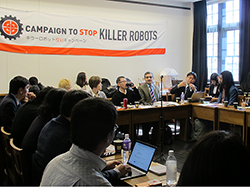キラーロボットのない世界に向けて、東京声明を採択しました
世界10ヵ国より市民社会団体の代表が参加

キラーロボット反対キャンペーンのアジア・太平洋会合にて議論する各国の代表(2019年2月20日)
2019年2月19日から20日にかけて、立教大学にてAAR Japan[難民を助ける会]が運営委員を務める世界的なNGOの連合体「キラーロボット反対キャンペーン(Campaign to Stop Killer Robots)」のアジア・太平洋会合が行われました。
同会合には、日本を含むアジア・太平洋地域から10ヵ国の市民社会団体の代表が参加し、キラーロボットとも呼ばれる自律型致死兵器システム(LAWS)の倫理、道徳、技術や安全保障などの課題について議論を深め、軍事利用に対して本キャンペーンが目標として掲げる「予防的な禁止条約の成立」に向けて戦略を策定しました。
最終日には「東京声明」を採択し、本キャンペーン活動を浸透させるために、各国の市民社会レベルで技術者や多様なセクターを含めたネットワークの構築に力を入れることや、国家レベルでの協力関係を推進することなどを盛り込みました。
AARは今後もキャンペーンのメンバーとして活動します。
声明:キラーロボット反対キャンペーン アジア太平洋地域会合 東京、日本、2019年2月19日‐20日
|
キラーロボット反対キャンペーンは2019年2月19日、20日に、アジア太平洋10ヵ国[1]から、メンバーおよびゲストの参加を得て、特定非営利活動法人難民を助ける会[AAR Japan]主催による地域会合を開催した。同会合には、キャンペーンの職員、運営委員、そしてロボット兵器規制国際委員会(ICRAC)の代表も参加した。 [1]バングラデシュ、インドネシア、日本、カザフスタン、パキスタン、パプアニューギニア、フィリピン、韓国、スリランカ、タイ |
Communique: Asia-Pacific Regional Meeting of the Campaign to Stop Killer Robots Tokyo, Japan, 19-20 February 2019
| Campaign to Stop Killer Robots members and guests from 10 states[1] in the Asia-Pacific region met in Tokyo, Japan on 19-20 February 2019 at the invitation of Association for Aid and Relief - Japan (AAR-Japan). Campaign staff and representatives from Steering Committee member the International Committee for Robot Arms Control (ICRAC) also participated. The aim of the meeting was to learn more about the serious ethical, moral, technical, legal, proliferation, and security concerns raised by fully autonomous weapons, also known as lethal autonomous weapons systems or killer robots. The participants strategized on how to achieve the campaign's goal of a pre-emptive ban treaty to retain meaningful human control over the use of force. The participants learned about the need for technology workers to be ethical in their work and ways to support tech worker activism. They considered the positive example set by KAIST in the Republic of Korea, which has committed not develop lethal autonomous weapons systems. The participants reflected on some measures that have been proposed to address concerns over killer robots, such as ethical principles on artificial intelligence, political declarations, greater transparency and legal reviews of new weapons systems. They concluded that these and other measures that fall short of a prohibition will be insufficient to deal with the urgent threat posed by the introduction of fully autonomous weapons. The participants reaffirmed the importance of tech, artificial intelligence, and robotics sectors in developing technology for peaceful purposes and civilian uses. They affirmed the urgent need for states from Asia and the Pacific to work to adopt a new treaty to prohibit development, production and use of fully autonomous weapons before they become operational. They acknowledged the need for further actions to address this issue at national, regional and international levels, inter alia: • Increase national outreach to raise public awareness and encourage political support for the goal of banning killer robots. Build capacity and leverage broad national campaign networks that include civil society groups as well as academics, roboticists, scientists, and other experts; • Foster greater cooperation by and between states from Asian and Pacific region towards the goal of launching negotiations of a new treaty. Encourage states to propose a negotiating mandate at the Convention on Conventional Weapons (CCW) to create a new ban protocol; • Grow the membership of the Campaign to Stop Killer Robots in the region, especially in countries where there is not yet a Campaign contact in place; • Consider a follow-up meeting in the region in late 2019. [1]Bangladesh, Indonesia, Japan, Kazakhstan, Pakistan, Papua New Guinea, Philippines, South Korea, Sri Lanka, Thailand |
